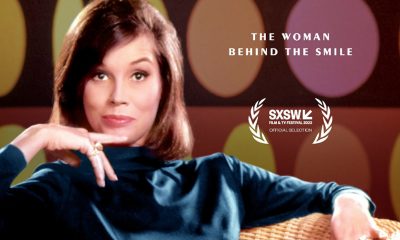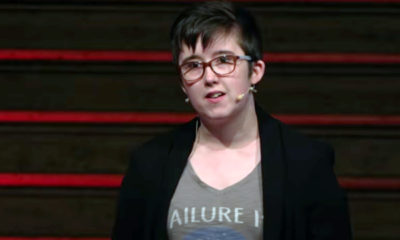Arts & Entertainment
Remembering the queer voices and allies we lost in 2019
Authors, artists and others who changed the world
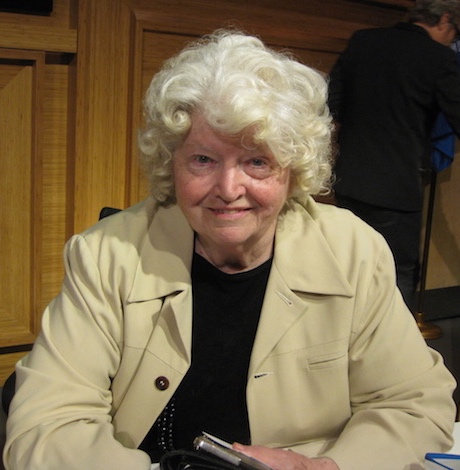
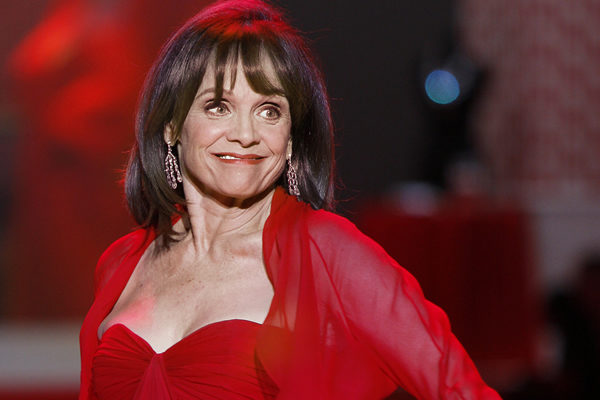
Many acclaimed LGBTQ people and allies died in 2019. They include:
Carol Channing, the legendary Broadway actress, died on Jan. 15 at age 97 in Rancho Mirage, Calif. She was best know for her performances as Lorelei Lee in “Gentlemen Prefer Blondes” and Dolly Gallagher Levi in “Hello Dolly!”
Mary Oliver, a lesbian poet, died on Jan. 17 at her Florida home at age 83. Her collection “American Primitive, won the 1984 Pulitzer Prize.
Harris Wofford, a Democratic senator and civil rights crusader, died on Jan. 21 at age 92. After his wife died, Wofford fell in love with Matthew Charlton. They married in 2018.
Barbra Siperstein, a transgender rights crusader died on Feb. 3 at age 76 from cancer at a New Brunswick, N.J. hospital. A New Jersey law bears her name. It permits people in New Jersey to change their gender on their birth certificates without having to prove they’ve had surgery.
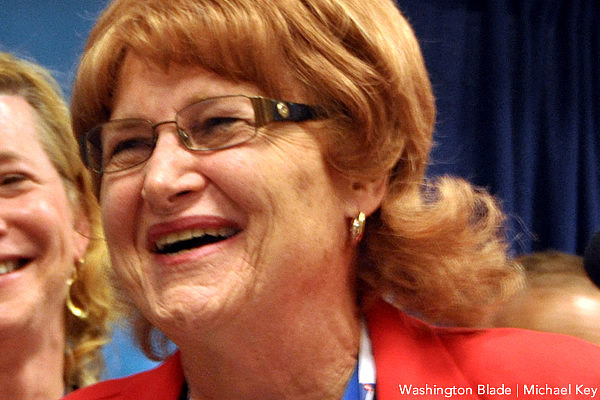
Patricia Nell Warren, author of the 1974 novel “The Front Runner” died on Feb. 9 at age 82 in Santa Monica, Calif. from lung cancer. The iconic book was one of the first to feature an open same-sex male relationship.
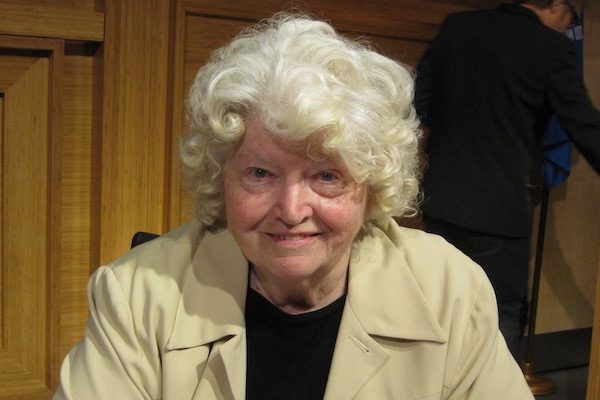
Hilde Zadek, a Vienna State Opera mainstay, died on Feb. 21 at 101 in Karlsruhe, Germany. She debuted in the title role of in Verdi’s “Aida” in 1947. She retired in 1971.
Jackie Shane, a black transgender soul singer who received a 2018 Grammy nomination for best historical album for her album “Any Other Way,” died at age 78 in Nashville. Her body was found at her home on Feb. 21.
Gillian Freeman, the British novelist who wrote the 1961 novel “The Leather Boys” died on Feb. 23 at age 89 in London. The book was one of the first to portray working-class gay characters.
Carrie Ann Lucas, a queer lawyer and disability rights advocate, died on Feb. 24 at age 47 in Loveland, Colo. She championed the rights of disabled parents.
John Richardson, an art historian renowned for his four-volume biography of Pablo Picasso, died at age 95 on March 12 at his Manhattan home.
Barbara Hammer, a lesbian filmmaker, died at age 79 from ovarian cancer at her partner Florrie Burke’s home in Manhattan on March 16. Hammer celebrated lesbian sexuality in “Dyketactics” and other films.
Dr. Richard Green, a psychiatrist, died at age 82 on April 6 at his London home. He was one of the first to critique the idea that being queer is a psychiatric disorder.
Michael Fesco, the nightclub owner who provided open spaces (Ice Palace, Flamingo and other venues) for gay men to dance when LGBTQ people couldn’t be out, died on April 12 at age 84 in Palm Springs, Calif.
Lyra McKee, a 29-year-old, queer Northern Ireland journalist, died on April 18. She was killed while covering violence in Londonderry.
Giuliano Bugialli, a gay culinary historian and three-time James Beard Award winner, died at age 88 on April 26 in Viareggio, Italy.
Doris Day, queer icon, actress and singer best known for her romantic comedies with Rock Hudson, died at age 97 on May 13 at her Carmel Valley, Calif. home from pneumonia.
Binyavanga Wainaina, a Kenyan author, founder of the magazine “Kwani?” and one of the first prominent African writers to come out as gay, died at age 48 on May 21 in a Nairobi hospital.
Charles A. Reich, author of the 1970 counter-culture manifesto “The Greening of America,” died on June 15 at age 91 in San Francisco.
Douglas Crimp, an art critic and AIDS activist, died on July 5 at age 74 at his Manhattan home from multiple myeloma. He wrote many articles for journals. Yet he also attended meetings of the AIDS group ACT UP.
Elka Gilmore, a queer chef known for her fusion cuisine, died at age 59 on July 6 in San Francisco. The New York Times Magazine called her “the enfant terrible of the modern California kitchen.”
George Hodgman, a gay editor, died on July 19 at age 60 at his Manhattan home. The cause was thought to be suicide. Hodgman’s memoir “Bettyville” is his story of staying in Paris, Mo. with his widowed mother who had dementia.
Lee Bennett Hopkins, a gay poet who wrote and edited many books for children, died on Aug. 8 at age 81 in Cape Coral, Fla. In 2018, he edited “World Make Way: New Poems Inspired by Art from The Metropolitan Museum.”
Sally Floyd, one of the inventors of Random Early Detection (RED), a widely used internet algorithm, died at age 69 on Aug. 25 at her Berkeley, Calif. home from cancer. She is survived by her wife Carole Leita.
Valerie Harper, the actress best known as Rhoda Morgenstern on “The Mary Tyler Moore Show,” died on Aug. 30 at age 80 from cancer. Harper was D.C.’s 2009 Capital Pride Parade grand marshal.
Rip Taylor, a gay comedian known as The King of Confetti, died on Oct. 6 at age 88 at Cedars-Sinai Medical Center in Los Angeles.
John Giorno, a gay artist, died on Oct. 11 at his home in Manhattan at age 82. In 1969, he founded Dial-A-Poem, a communications system enabling people to hear Allen Ginsberg and other poets read their poems.
Gillian Jagger, an artist whose work (installations of animal carcasses and tree trunks) wasn’t aligned with any one movement, died on Oct. 21 in Ellenville, N.Y. at age 88. “I felt that nature held the truth I wanted,” she told the U.K’s Public Monuments and Sculpture Association magazine. She is survived by her wife Connie Mander.
Howard Cruse, a gay cartoonist whose comic strip “Wendel” ran in The Advocate for several years, died on Nov. 26 at age 75 in Pittsfield, Mass. from lymphoma. His graphic novel “Stuck Rubber Baby” and other work influenced other queer cartoonists. He is survived by his husband Ed Sedarbaum.
Michael Howard, a gay military historian and decorated combat veteran and pioneer of the “English school” of strategic studies, died on Nov. 30 in Swindon, England at age 97.
Shelley Morrison, who played Rosario on “Will and Grace” from 1999 to 2006, died on Dec. 1 in Los Angeles at age 83 from heart failure.
William Luce, who wrote the acclaimed plays “The Belle of Amherst” about Emily Dickinson and “Barrymore” about John Barrymore, died on Dec. 9 at a memory-care facility in Green Valley, Ariz. at age 88. Ray Lewis, his partner of 50 years, died in 2001.
Photos
PHOTOS: Montgomery County Pride in the Plaza
LGBTQ celebration held in downtown Silver Spring

Montgomery County Pride in the Plaza was held on Sunday, June 29 at Veterans Plaza in Silver Spring, Md.
(Washington Blade photos by Michael Key)























The fifth annual Fredericksburg Pride march and festival was held on Saturday, June 28. A march through the streets of downtown Fredericksburg, Va. was followed by a festival at Riverfront Park.
(Washington Blade photos by Michael Key)



















India
Anaya Bangar challenges ban on trans women in female cricket teams
Former Indian cricketer Sanjay Bangar’s daughter has received support

Anaya Bangar, the daughter of former Indian cricketer Sanjay Bangar, has partnered with the Manchester Metropolitan University Institute of Sport in the U.K. to assess her physiological profile following her gender-affirming surgery and undergoing hormone replacement therapy.
From January to March 2025, the 23-year-old underwent an eight-week research project that measured her glucose levels, oxygen uptake, muscle mass, strength, and endurance after extensive training.
The results, shared via Instagram, revealed her metrics align with those of cisgender female athletes, positioning her as eligible for women’s cricket under current scientific standards. Bangar’s findings challenge the International Cricket Council’s 2023 ban on transgender athletes in women’s cricket, prompting her to call for a science-based dialogue with the Board of Control for Cricket in India and the ICC to reform policies for trans inclusion.
“I am talking with scientific evidence in my hand,” Bangar said in an interview posted to her Instagram page. “So, I hope, this makes an impact and I will be hoping to BCCI and ICC talking with me and discussing this further.”
On Nov. 21, 2023, the ICC enacted a controversial policy barring trans women from international women’s cricket. Finalized after a board meeting in Ahmedabad, India, the regulation prohibits any trans player who has experienced male puberty from competing, irrespective of gender-affirming surgery or hormone therapy. Developed through a 9-month consultation led by the ICC’s Medical Advisory Committee, the rule aims to safeguard the “integrity, safety, and fairness” of women’s cricket but has drawn criticism for excluding athletes like Canada’s Danielle McGahey, the first trans woman to play internationally. The policy, which allows domestic boards to set their own rules, is slated for review by November 2025.
Bangar shared a document on social media verifying her participation in a physiological study at the Manchester Metropolitan University Institute of Sport, conducted from Jan. 20 to March 3, 2025, focused on cricket performance. The report confirmed that her vital metrics — including hemoglobin, blood glucose, peak power, and mean power — aligned with those of cisgender female athletes. Initially, her fasting blood glucose measured 6.1 mmol/L, slightly above the typical non-diabetic range of 4.0–5.9 mmol/L, but subsequent tests showed it normalized, reinforcing the study’s findings that her physical profile meets female athletic standards.
“I am submitting this to the BCCI and ICC, with full transparency and hope,” said Bangar. “My only intention is to start a conversation based on facts not fear. To build space, not divide it.”
In a letter to the BCCI and the ICC, Bangar emphasized her test results from the Manchester Metropolitan University study. She explained that the research aimed to assess how hormone therapy had influenced her strength, stamina, hemoglobin, glucose levels, and overall performance, benchmarked directly against cisgender female athletic standards.
Bangar’s letter to the BCCI and the ICC clarified the Manchester study was not intended as a political statement but as a catalyst for a science-driven dialogue on fairness and inclusion in cricket. She emphasized the importance of prioritizing empirical data over assumptions to shape equitable policies for trans athletes in the sport.
Bangar urged the BCCI, the world’s most influential cricket authority, to initiate a formal dialogue on trans women’s inclusion in women’s cricket, rooted in medical science, performance metrics, and ethical fairness. She called for the exploration of eligibility pathways based on sport-specific criteria, such as hemoglobin thresholds, testosterone suppression timelines, and standardized performance testing. Additionally, she advocated for collaboration with experts, athletes, and legal advisors to develop policies that balance inclusivity with competitive integrity.
“I am releasing my report and story publicly not for sympathy, but for truth. Because inclusion does not mean ignoring fairness, it means measuring it, transparently and responsibly,” said Bangar in a letter to the BCCI. “I would deeply appreciate the opportunity to meet with you or a representative of the BCCI or ICC to present my findings, discuss possible policy pathways, and work towards a future where every athlete is evaluated based on real data, not outdated perceptions.”
Before her transition, Bangar competed for Islam Gymkhana in Mumbai and Hinckley Cricket Club in the U.K., showcasing her talent in domestic cricket circuits. Her father, Sanjay Bangar, was a dependable all-rounder for the Indian national cricket team from 2001 to 2004, playing 12 test matches and 15 One Day Internationals. He later served as a batting coach for the Indian team from 2014 to 2019, contributing to its strategic development.
Cricket in India is a cultural phenomenon, commanding a fanbase of more than 1 billion, with more than 80 percent of global cricket viewership originating from the country.
The International Cricket Council, the sport’s governing body, oversees 12 full member nations and more than 90 associate members, with the U.S. recently gaining associate member status in 2019 and co-hosting the 2024 ICC Men’s T20 World Cup. The BCCI generated approximately $2.25 billion in revenue in the 2023–24 financial year, primarily from the Indian Premier League, bilateral series, and ICC revenue sharing. The ICC earns over $3 billion from media rights in India alone for the 2024–27 cycle, contributing nearly 90 percent of its global media rights revenue, with the BCCI receiving 38.5 percent of the ICC’s annual earnings, approximately $231 million per year.
Women’s cricket in India enjoys a growing fanbase, with over 300 million viewers for the Women’s Premier League in 2024, making it a significant driver of the sport’s global popularity. The International Cricket Council oversees women’s cricket in 12 full member nations and over 90 associate members, with the U.S. fielding a women’s team since gaining associate status in 2019 and competing in ICC events like the 2024 Women’s T20 World Cup qualifiers. The BCCI invests heavily in women’s cricket, allocating approximately $60 million annually to the WPL and domestic programs in 2024–25, while contributing to the ICC’s $20 million budget for women’s cricket development globally. India’s media market for women’s cricket, including WPL broadcasting rights, generated $120 million in 2024, accounting for over 50 percent of the ICC’s women’s cricket media revenue.
“As a woman, I feel when someone says that they are women, then they are, be trans or cis. A trans woman is definitely the same as a cis woman emotionally and in vitals, and specially, when someone is on hormone replacement therapy. Stopping Anaya Bangar from playing is discrimination and violation of her rights. It is really sad and painful that every trans woman need to fight and prove their identity everywhere,” said Indrani Chakraborty, an LGBTQ rights activist and a mother of a trans woman. “If ICC and BCCI is stopping her from playing for being transgender, then I will say this to be their lack of awareness and of course the social mindsets which deny acceptance.”
Chakraborty told the Blade that Bangar is an asset, no matter what. She said that the women’s cricket team will only benefit by participation, but the discriminating policies are the hindrance.
“Actually the transgender community face such discrimination in every sphere. In spite of being potent, they face rejection. This is highly inhuman. These attitudes is regressive and will never let to prosper. Are we really in 2025?,” said Chakraborty. “We, our mindset and the society are the issues. We, as a whole, need to get aware and have to come together for getting justice for Anaya. If today, we remain silent, the entire community will be oppressed. Proper knowledge of gender issues need to be understood.”
The BCCI and the International Cricket Council have not responded to the Blade’s repeated requests for comment.

